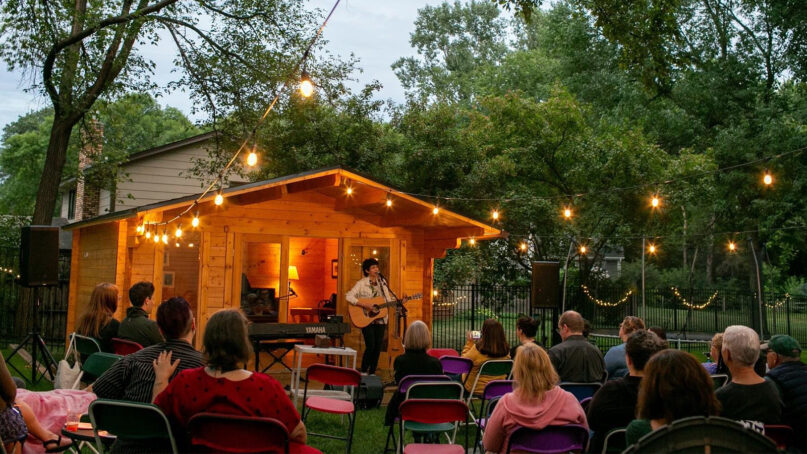ANN ARBOR, Mich. (RNS) — Top surgery, puberty, religion — these topics are all fair game at a Spencer LaJoye concert.
“I didn’t grow up learning that I should trust anything that my body was telling me,” said LaJoye, 30, to an audience lounging in lawn chairs in an Ann Arbor backyard on June 7. “I grew up learning to trust the Lord.”
LaJoye, strumming a large acoustic guitar and wearing their dad’s oversized flannel shirt, interspersed ballads with anecdotes about their Christian upbringing and queer identity. By the end of the set, audience members were visibly moved.
“I didn’t expect to love this,” said Lara Zielin, who told Religion News Service she is a “recovering evangelical Christian.” “It felt like storytelling and poetry and truth all wrapped up in the most unexpectedly beautiful music.”
“Holy shit,” was another audience member’s response.
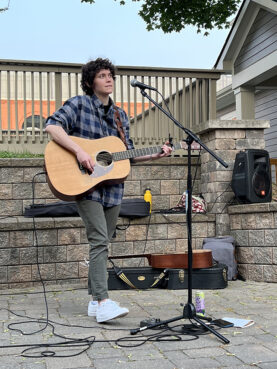
Spencer LaJoye plays a backyard set in Ann Arbor, Mich., on June 7, 2023. RNS photo by Kathryn Post
LaJoye’s pre-teen days of leading a worship cover band called “Jesus Rocks” have given way to a deeply personal folk/pop fusion style with an emotional gut punch. Their piercing lyrics, which dabble in religious imagery, are as textured as the intricate sounds LaJoye layers on their loop pedal. LaJoye has won folk songwriting competitions, opened Christian conferences and had viral hits adapted into commissioned choir pieces. And though they no longer identify as Christian, LaJoye is routinely invited to perform in churches, perhaps because their music dares to posit questions some church folks are hesitant to speak aloud.
Raised in Hastings, Michigan, LaJoye was baptized as an infant by both a Presbyterian minister and a Catholic priest — a “Presba-catholic,” they joke. In middle school, evangelicals welcomed LaJoye to their lunch table and, later, to 7 a.m. Bible studies at the local McDonald’s.
LaJoye entered Calvin College, a school in Grand Rapids, Michigan, affiliated with the Christian Reformed Church, as a violin major in 2011. They slid easily into the role of chapel worship leader, but LaJoye was distressed when worship began to evoke dissonance rather than reassurance.
“I wasn’t even out to myself yet in early college,” LaJoye told RNS. “I didn’t know why things were incongruent in my heart and my mind and why I felt like I was different from everybody else who was worshipping.”
LaJoye described sneaking into the art center’s practice rooms at night, crouching in a corner to evade the motion detectors and sobbing, while writing music about their shifting beliefs.
When LaJoye was a junior, a chapel series on sex and sexuality coincided with LaJoye switching to a religion major and developing feelings for their best friend. This perfect storm of events sent LaJoye wading into the writings of the apostle Paul, “which is a really bad place to spend your time if you’re feeling ashamed of your body and your sexuality,” they said. Eventually, LaJoye decided to “agree to disagree” with the passages interpreted to condemn queer people and queer sex as sinful.
“I count myself as very fortunate that coming out of that time of self-loathing, I chose myself and I didn’t choose Paul. I don’t like to think about what would have happened if I would have kept choosing Paul.”
By senior year, they began telling close friends and family they were bisexual. The response was overwhelmingly positive — LaJoye’s eight housemates baked a peanut butter pie when LaJoye came out to their parents.
That was also the day LaJoye reconnected with Whitney Wilson, a recent Calvin graduate who texted LaJoye out of the blue. The two began exchanging long theological treatises that grew into a long-distance romance.
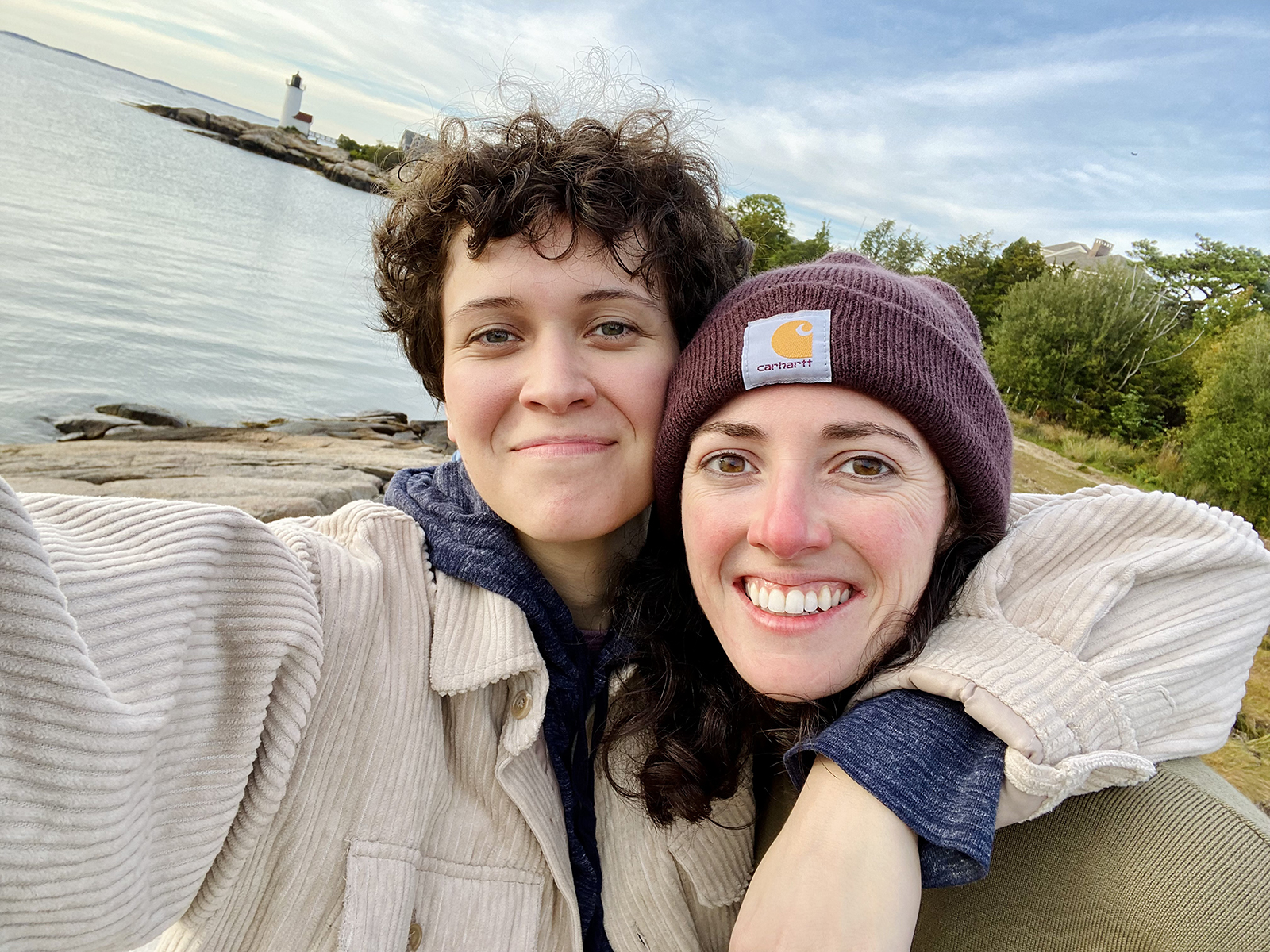
Spencer LaJoye, left, and Whitney Wilson in September 2022. Photo courtesy LaJoye
In 2016, LaJoye followed Wilson to Denver and enrolled at Iliff School of Theology. They quickly secured an invite to an open mic night at the now-defunct Syntax Physic Opera. When their slot was finally up around 11 p.m., they climbed onto the sticky wooden stage, played three of their best songs and gave a dynamic performance. LaJoye’s future in the Denver music scene was secured.
By 2021, LaJoye had married Wilson, come out as nonbinary, graduated seminary, established their music career and taken on the name Spencer. While they’d entered seminary hurt by the conditional acceptance of non-LGBTQ-affirming churches and bitter at evangelicals for electing Donald Trump, they said they left feeling tender toward Christianity, even as faith felt more distant.
“I think it’s because it started to matter less to me, Christianity in general,” LaJoye observed. “And so it started to matter less to me how people believe. I stopped needing to control what they believed and how they expressed that.”
LaJoy’s gradual departure from Christianity was complicated by their employment as a songwriter for several churches. Despite the congregations’ affirming theology, crafting authentic worship music was painful.
“I had to put myself back in my old shoes in order to write worshipfully. And my body did not like that,” LaJoye explained. “I cried a lot. I panicked a lot and dissociated a lot to get the job done. And there was a moment where I thought, you know what, these churches that I’m working for wouldn’t want this for me.”
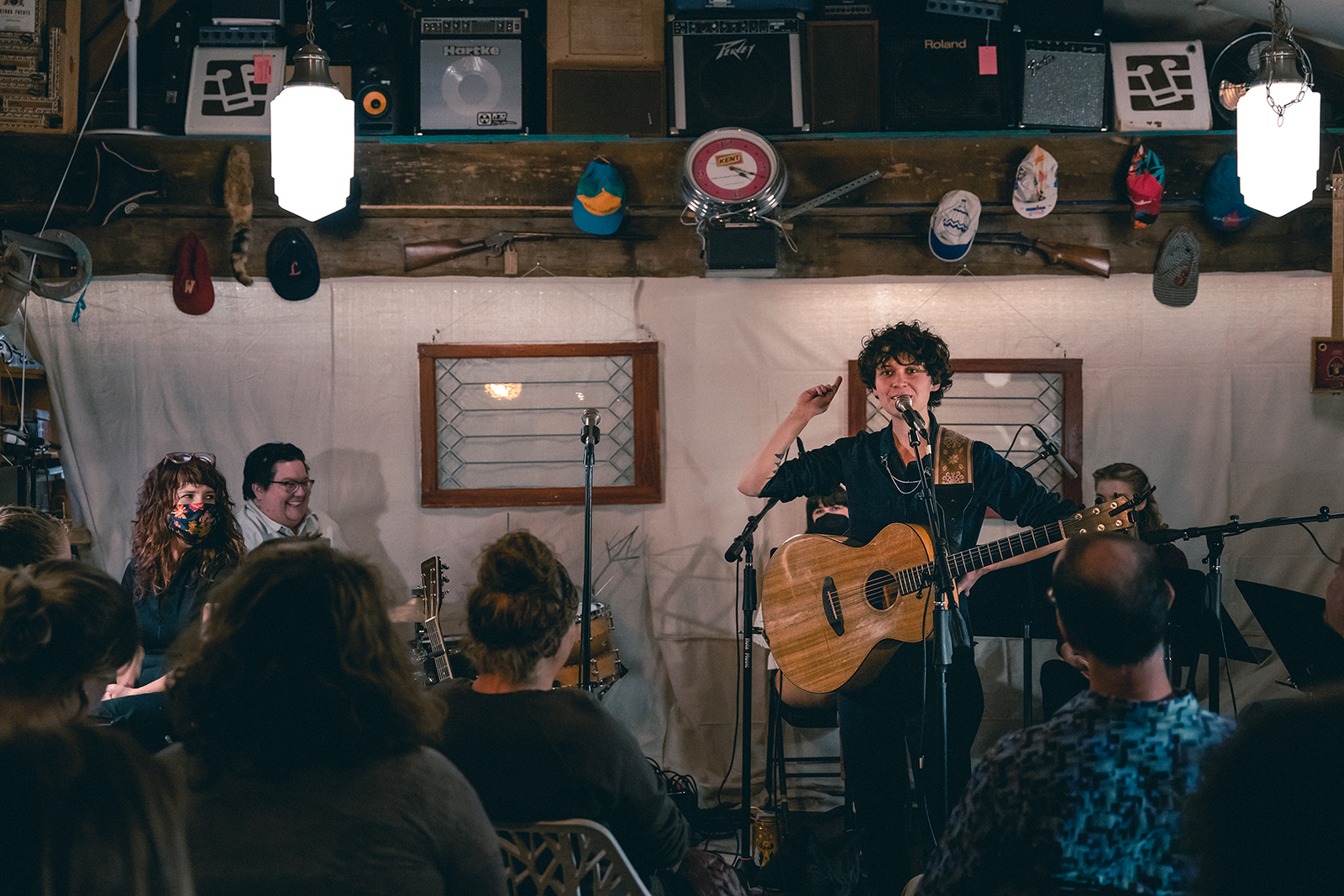
Spencer LaJoye speaks during the release concert for “Remember the Oxygen” in November 2021. Photo by Cole Naylor
Their parting task was to compose for a prayer gathering, a dilemma for a songwriter who didn’t pray. Walking their dog and, later, as they fell asleep, lines came to LaJoye in waves: “I pray that your body gets all that it needs / And if you don’t want healing, I just pray for peace.” And “Amen for the mothers of little Black sons / Amen for the kids who grow up scared of guns.”
The lyrics felt more authentic than any prayer LaJoye had prayed in years.
Two days later, LaJoye ad-libbed a melody, recorded the song on a laptop in their kitchen and posted a draft of “Plowshare Prayer” to Facebook.
“It blew up immediately. And I was like, well, I guess I can never change the melody,” LaJoye said with a laugh.
With the song’s near-instant success (one video of it has been viewed over 74,000 times), LaJoye’s inbox was flooded by appreciative listeners.
“I could see how much it meant to people. And I believed in what the song said,” LaJoye said. “But I never really got to have my own experience with the song. I was just the voice of it.”
That changed last summer when a choir accompanied LaJoye in a rendition of the song at a Unitarian Universalist Church in Orange County, California. Under the fluorescent lights of the church fellowship hall, the group of older church folks belted the line “Amen for the queers and their closeted peers!” In a holy exchange, LaJoye said the lyrics landed like it was their first time hearing them.
In October 2022, LaJoye sang the song to a crowd at the Evolving Faith conference, which is designed for Christians and “spiritual refugees.” One month later, a Presbyterian USA church in Columbus, Ohio, commissioned and premiered a choral arrangement of “Plowshare Prayer,” and in April 2023, a United Church of Christ congregation in Somerville, Massachusetts, designed an Easter liturgy around the song.
“Spencer is straddling this line between being within and outside of a faith tradition,” said the Rev. Jenn Macy, lead pastor of First Church Somerville. “A lot of prophetic work both sits within and outside of a tradition, calling people forward towards a future that is closer to God’s vision than what we currently have.”
These days, LaJoye identifies as spiritual. “I’ll believe in whatever causes no harm. Enneagram? Bet. Astrology? Sure. Ghosts? Probably. So I guess I’m more spiritual than ever,” LaJoye told RNS in an email. But they still cherish some Christian imagery that finds its way into their songwriting, rendering it both accessible and provocative for church audiences.
“Among evangelicalism … there’s a real lack of authenticity. It’s, look as holy as you can,” Wilson observed. “For someone to be coming out and saying there’s holiness in authenticity, in messiness, in missing the mark, I think that is a breath of fresh air for so many Christians.”
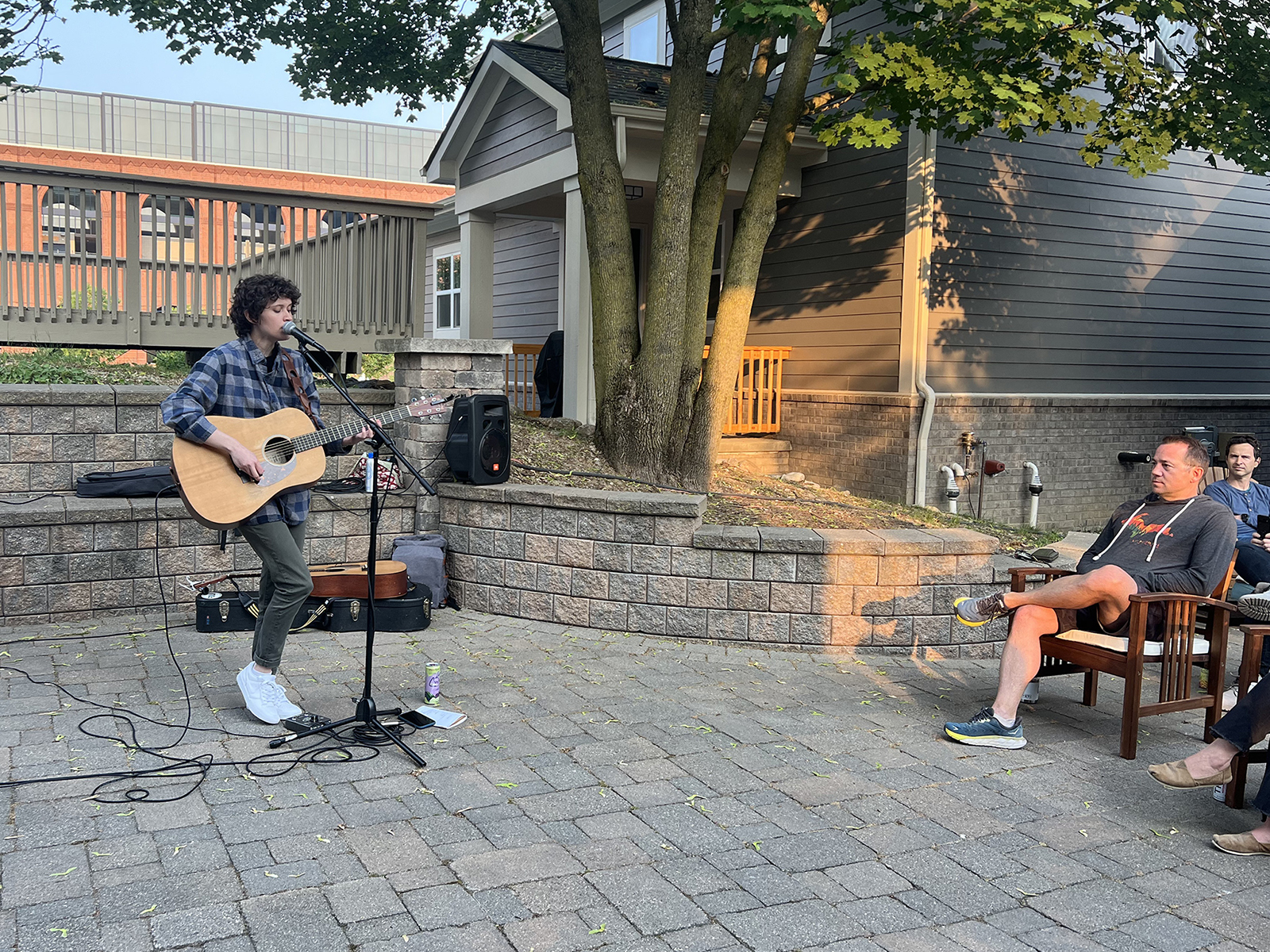
Spencer LaJoye plays a backyard set in Ann Arbor, Mich., on June 7, 2023. RNS photo by Kathryn Post
This summer, LaJoye is recording a new 12-song album called “Shadow Puppets” about events from their past that have grown clearer with distance. LaJoye’s producer Chris DuPont described LaJoye as a “force” in the studio who exhibits single-minded intensity, expert technical skill and “arresting” vocals.
“Ever since stepping into their name and who they want to be, I think I’m seeing their music land better, because the person delivering it knows who they are,” said DuPont. “And I think that shows.”
For LaJoye, their latest album also signals a shift from songs that preach a sermon to ones that offer a glimpse of humanity, without having to make a point.
“My little slogan was, ‘You’re made of the good stuff,’ which is to counter the Calvinist message that you’re not made of the good stuff, actually, you’re made of stuff that is totally depraved,” said LaJoye.
“These songs are more just storytelling. And I think now when I look at my beautiful fellow human beings, I feel less of a need to tell us all we’re good, and more of an urge to just be like, being human is weird, right?”
This coverage is presented with the support of the E. Rhodes and Leona B. Carpenter Foundation.
